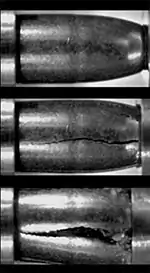frangible
English
Etymology

From Late Middle English franǧī̆ble, franǧī̆bil,[1] from Middle French frangible, or from Medieval Latin frangibilis, from Latin frangere[2] (from frangō (“to break, shatter”), from Proto-Indo-European *bʰreg- (“to break”)) + -ibilis (“suffix forming adjectives indicating a capacity or worth of being acted upon”).
Pronunciation
- (Received Pronunciation) IPA(key): /ˈfɹæn(d)ʒɪb(ə)l/
- (General American) IPA(key): /ˈfɹændʒəbəl/
- Rhymes: -ændʒɪbəl
- Hyphenation: fran‧gi‧ble
Adjective
frangible (comparative more frangible, superlative most frangible)
- Able to be broken; breakable, fragile. [from early 15th c.]
- 1734, “GLASS”, in The Builder’s Dictionary: Or, Gentlemen and Architect’s Companion. Explaining not only the Term of Art in All the Several Parts of Architecture, but also Containing the Theory and Practice of the Various Branches thereof, [...] In Two Volumes, volume I, London: Printed for A[rthur] Bettesworth and C[harles] Hitch, at the Red-Lion in Pater-noster-Row; and S[tephen] Austen, at the Angel and Bible in St. Paul's Church-Yard, OCLC 863402509, column 1:
- A certain learned and curious Author gives us the following Characters or Properties of Glaſs, whereby it is diſtinguiſh'd from all other Bodies, viz. […] That it is frangible when thin, without annealing.
- 1838, W[illiam] W[illiams] Mather, “Iron Ore”, in First Annual Report on the Geological Survey of the State of Ohio, Columbus, Oh.: Samuel Medary, printer to the State, OCLC 2600677, footnote, page 7:
- Another object still [of roasting iron ore], is to make the ore more frangible, that it may be easily broken into fragments of a suitable size for smelting.
- 1989, Charles Panati, “From Superstition”, in Panati’s Extraordinary Origins of Everyday Things (Perennial Library), New York, N.Y.: Harper & Row, →ISBN, page 16:
- Folklorists claim that the superstitious belief that opening an umbrella indoors augurs misfortune has a more recent and utilitarian origin. In eighteenth-century London, when metal-spoked waterproof umbrellas began to become a common rainy-day sight, their stiff, clumsy spring mechanism made them veritable hazards to open indoors. A rigidly spoked umbrella, opening suddely in a small room, could seriously injure an adult or a child, or shatter a frangible object.
- 1998 March, Richard Marcinko; John Weisman, “Part Two: Trust but Verify”, in Destination Gold (Rogue Warrior), New York, N.Y.: Pocket Books, →ISBN, page 183:
- So, to make sure that I stay both current and deadly, I built the range, where the guys can sharpen their lethal talents, and—careful always to use only approved military weapons—I can sharpen mine. Shooting, after all, is a frangible skill. At SEAL Team Six we shot daily.
-
Usage notes
The word is often used to refer to objects which are made intentionally breakable, either as part of their operation (such as frangible bullets and frangible nuts), or for use in an emergency (such as frangible light poles or smoke outlet panels).
Synonyms
- fragmentable (not idiomatically interchangeable although denotatively equal)
Antonyms
- infrangible, indestructible, nonbrittle, unbreakable, unfragile
- unfrangible (obsolete)
Derived terms
- frangibility
- frangibleness
- frangibly
- infrangible
- nonfrangible
- unfrangible
Related terms
Translations
Noun
frangible (plural frangibles)
- Something that is breakable or fragile; especially something that is intentionally made so, such as a bullet.
- 2009, Robert K. Campbell, “Practice Tools”, in Dan Shideler, editor, The Gun Digest Book of Personal Protection & Home Defense, Iola, Wis.: Gun Digest Books, →ISBN, page 201, column 2:
- For extreme close range training, frangible bullets – those that disintegrate on hitting a hard target – are available. I have found the Winchester frangible loads especially suitable to high-volume training with the 9mm pistol. Frangibles are intended to give peace officers real safety when training at close range with steel reaction targets and vehicles used as range props.
- 2012, G. Paul Chambers, Head Shot: The Science behind the JFK Assassination, expanded edition, Amherst, N.Y.: Prometheus Books, →ISBN:
- Is there some law of nature that states that an assassin can only use one kind of ammunition? Couldn't he just as easily load a frangible bullet and a nonfrangible one into his magazine as two frangibles or two regular, hardened rounds?
- 2013, Robert E. Walker, “Ammunition Cartridges”, in Cartridges and Firearm Identification (Advances in Materials Science and Engineering), Boca Raton, Fla.: CRC Press, →ISBN, page 82:
- Like other lethal-use frangibles, it is designed exclusively for use against soft targets. The "projectile" is composed of tungsten powder encapsulated by a traditional copper jacket. The powdered medium itself does not comprise a solid-mass projectile, per se, but it is tightly packed and contained within the jacket, which acts as the container. Like all frangible projectiles, these projectiles return to powder when impacting an object.
-
References
- “franǧī̆ble, adj.” in MED Online, Ann Arbor, Mich.: University of Michigan, 2007, retrieved 7 November 2017.
- “frangible” in Douglas Harper, Online Etymology Dictionary, 2001–2019.
Catalan
Etymology
From Latin frangibilis.
Adjective
frangible (masculine and feminine plural frangibles)
- frangible, breakable
- Synonym: trencable
- Antonym: infrangible
Derived terms
- frangibilitat
Related terms
Further reading
- “frangible” in Diccionari de la llengua catalana, segona edició, Institut d’Estudis Catalans.
French
Pronunciation
- IPA(key): /fʁɑ̃.ʒibl/
Adjective
frangible (plural frangibles)
- frangible, breakable
- Synonyms: cassable, brisable
- Antonym: infrangible
Derived terms
- frangibilité
Related terms
Further reading
- “frangible” in le Trésor de la langue française informatisé (The Digitized Treasury of the French Language).
Middle English
Etymology
From Middle French frangible, or from Medieval Latin frangibilis,[1] from Latin frangere,[2] from frangō (“to break, shatter”), from Proto-Indo-European *bʰreg- (“to break”).
Pronunciation
- IPA(key): /ˈfran.d͡ʒi.bl(ə)/, /franˈd͡ʒiː.bl(ə)/
Alternative forms
- franǧī̆bil
References
- “franǧī̆ble, adj.” in MED Online, Ann Arbor, Mich.: University of Michigan, 2007, retrieved 7 November 2017.
- “frangible” in Douglas Harper, Online Etymology Dictionary, 2001–2019.
Middle French
Spanish
Etymology
From Medieval Latin frangibilis.
Pronunciation
- IPA(key): /fɾanˈxible/, [fɾãŋˈxiβle]
Related terms
Further reading
- “frangible” in Diccionario de la lengua española, Vigésima tercera edición, Real Academia Española, 2014.